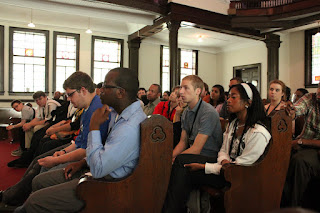Download Audio
My most recent story on the PRI-WGBH-BBC Program "The WORLD".
50 years ago this month, black and white activists boarded buses in Washington and headed into the Deep South. That took courage in 1961.The year before, the Supreme Court had made segregation illegal in interstate travel. But the law wasn’t being enforced in the South. And so those bus passengers forced the issue.
They became known as the “Freedom Riders.”
This month, a racially integrated group of 40 American – and foreign – students recreated the Freedom Riders’ journey. Ray Arsenault, the author of a history of the Freedom Riders of 1961, is leading a group of 40 College students on a tour of one of Alabama’s most notorious sites. This place just outside of Anniston, Alabama, is where fifty years ago, the Ku Klux Klan attacked a Freedom Riders’ Greyhound bus bound for New Orleans. After slashing the tires, the bus was firebombed, which forced the riders into the road.
Along this highway outside of Anniston, Zilong Wang, who was born many years after 1961 in Baotou, China, is thinking about the lessons of non-violence practiced by the original Freedom Riders and how they might guide his beliefs and actions.
“This is not just a healing of the past but also it sheds a light on the future. Not just a future of the United States but also for China, because China will definitely go through a similar period,” Wang said. “How can we use non-violence and civil disobedience to bring meaningful reform into China’s social system under the condition of social harmony and stability, I think we’re learning a lot from them.”
Wang, a philosophy student at Hampshire College in Amherst, Massachusetts, is one of a handful of students chosen to board a bus from DC to New Orleans, to re-create the journey of 50 years ago along with original freedom riders. They met important figures from the time along the route.
Like John Siegenthaler, who was an assistant to US Attorney General Robert Kennedy in 1961. He pointed out the contradictions of era – the Administration was pushing for freedoms around the world even as president Kennedy tolerated segregation and injustice throughout the Jim Crow South.
“The timing of the Freedom Rides and the conflagration that he (President Kennedy) hoped would never come, came at exactly the wrong time,” Siegenthaler said. “Came at the moment when’ he ‘s not able to make a convincing case about freedoms around the world, is not able to convince the Soviet Union ‘look free your people, let your people go. He’s not able to make that case because he had not let his own people go.” Siegenthaler said that the critical worldwide focus on domestic events in the USA helped to push the Administration into supporting civil rights.
Those events included attacks on Freedom Riders at this Trailways Bus Terminal in Birmingham, Alabama. This is the 8th city visited by the students on Freedom Ride 2011. Here Zilong Wang comes face to face with Freedom Rider James Zwerg, whose bloodied face peered from newspapers in 1961 helped compel hundreds of new riders to join the movement. Zwerg offers the college kids some pointers for their struggles, whatever they may be.
Follow the money: “If you want to bring about change you’re going to have to go the decision makers. In trying to change the movie theaters, it wasn’t going to happen,” Zwerg said. “In Nashville, for example, we had to make the people who owned the theaters decide to change.”
On this journey South, Zilong Wang and his fellow travelers also learned about the ultimate price that some paid for the advancement of human rights in the United States. The bus carring the 40 students has stopped in front of the 16th Street baptist Church in Birmingham. A bomb planted here took the lives of four little girls on September 15th , 1963.
And over the din of the 16th Street Baptist Church Choir, Doaa Dorgham, a Palestinian born in Kuwait who wears a headscarf, laments what she sees as the irony of past and present discrimination in her adopted American land. “The irony of this situation is here I am celebrating how 50 years ago we made great strides to stop segregation in public transportation and discrimination, and then I’m in an airport and have to go through a body scan and have to go through a pat-down. And how is it that no one is able to see the correlation?” Dorgham asked.
As the Freedom Riders’ Tour winded down, students were asked what they will do with the knowledge they’ve collected along the way. Tanya Smith, who grew up in Haiti, and plans to return there to lead a non-violent movement on behalf of youth, spoke up.
“Just like the Freedom Riders saw the need in society for change, Haitian youth realize the power they do have and the stake they have for building Haiti’s future,” she said. “And I want to be able show that non-violence is more effective in the sense that you’re able to do what you’re doing without resorting to the same tools that your oppressors are using against you.”






No comments:
Post a Comment